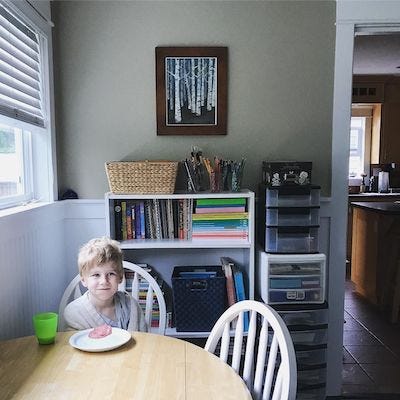Sunday synthesis: decision misery and imagining time
All I really need to do is mop my floors

Readwise served me up some gems this morning: quotes I highlighted a while back that serendipitously went hand in hand with my friend Holly Wren Spaulding’s “Secret Life” course, which I took a few years ago and have lately been revisiting in my early-morning read-think-dream-write time.
(This is what I love about Readwise: its daily review option surfaces five quotes I’ve highlighted in my reading, going back years and years. Revisiting them, these passages I’ve marked as Kindle highlights or have captured manually from print, I see connections. Themes and threads appear, revealing my own thought-patterns to me.)
Here was the thread this morning:
In Holly’s Secret Life course (which I think she’ll be offering again in the new year), she contemplates the ways in which
“…busyness depletes the vitality required for true creative work, and does so by seducing us with the illusion of productivity; a sense that we are ‘doing’ something, even when, in the larger scheme of things, there are other involvements and interests that matter more, or which really represent our work.”
Emphasis mine. Those words leapt out at me; they’re an apt summary of the year I’ve had. Much busyness (most of it necessary, most of it related to the unexpected events that led to our buying a house and then getting Covid ten days before the move), and, yes, a serious depletion of creative vitality.
I knew I was pouring my creative energy into other, absolutely worthwhile projects—setting up the new house; writing loads and loads of playful literature guides for Brave Writer—but I did feel an uneasiness about how little energy I had for making art. I could accept that this wasn’t a season of life for getting a lot of work done on the new book or the embroidery series—but it bothered me (“a feeling of thwartedness,” Holly calls it) that I was too drained even to give these projects thought.
“Fruitful daydreaming,” as Eric Maisel puts it. “Imagining time.”
In A Writer’s Space, Maisel discusses ways we so often let busyness distract us from the work we care about most:
It may be the case that you have cultivated the good habit of fruitfully daydreaming the second you hear the lap of waves, the singing of jays, or the click of your study door closing.
Or you may have cultivated the bad habit of always distracting yourself from your art.
That, sad to say, is what happens too often. Writers and would-be writers get in the bad habit, sometimes the lifelong bad habit, of filling every space, even the most sunlit and auspicious ones, with pennyweight, sandpapery thoughts designed to keep their imagination at bay.
His rather wonderful advice is to stop worrying about doing the work, and instead give yourself a protected time in which to simply think about it.
1. Set aside some imagining time, maybe twenty minutes or even an hour.
2. Smile a little, by way of alerting yourself to the fact that you mean to get dreamy and visit faraway places.
3. Slowly silence your busy thoughts. Imagine that you have a knob, like the knob on a tuner, that you can turn to lower the sound. Lower the sound on your thoughts until they are extinguished.
4. Keep smiling, even though the ensuing silence is a little unnerving.
5. Wait, holding the heartfelt intention that you will keep the door to your imagination open for as long as it takes, until blue elephants, space settlements, or your new novel strolls right in.
6. Wait, smiling, as if the moment to open presents was rapidly approaching.
7. Keep waiting. The longer you wait, the stronger the muscle you’ll build, the one you flex when you want to imagine.
This is what Holly Wren Spaulding calls the Secret Life.
How powerfully these words hit me, every time they resurface. No matter how much else occupies my time, there is always an unfettered space for thinking. I only have to remember to hold that space.
Eric Maisel recommends finding a physical space—a garden bench, for example—for your “imagining time,” but mine is most fruitful if my hands are busy: while weeding the garden, mopping a floor (this is why I genuinely love to mop floors), mending a pair of jeans.
Moving house kept my hands plenty busy, but it corralled my mind as well. Sorting and packing absolutely pull focus from the “dreamy, faraway spaces.”
And in the liminal spaces before falling asleep and just after awakening, I felt too exhausted for thought and fell into the pernicious habit of reaching for my phone.
Or else—and this is a form of distraction I’ve always been prone to—I busied myself with meta-ruminations about what I could do to fix the problem (uh, in hindsight: probably just get more sleep?) and what the absolute best time-blocking plan would be. Steve Chandler has a perfect take on this in Time Warrior:
"I can spend the whole day in a deep, soft chair trying to decide who I really am, trying to decide why I do what I do, trying to decide all kinds of things.
But I notice that I am now less effective and capable as a human, and my sense of trust in myself is disappearing. I call this Decision Misery."
Get out of my head, Chandler.
Decision misery is exactly that discomfort I experience when I’m trying to wrangle myself back into good practices—thinking about when and how I’m going to work on a project instead of simply thinking about the project. Do you experience this? Hyperfixating on the finger pointing at the moon, when you could be giving your attention to the moon?
Eric Maisel writes,
If you wait for a time when your muddle-headedness, mild depression, to-do lists, doubts about the universe, and a thousand other things you could name are finally handled or settled, you will wait for a very long time.
I’d say another form of decision misery, equally vexing, is the indecision over which fabulous idea to pursue first. More energy given to beginnings than middles—and it takes the long middle to get to the end of anything worthwhile.
Claire Wellesley-Smith, a fiber artist, understands the perils of too much rumination over options. In Slow Stitch: Mindful and Contemplative Textile Art, she writes:
“The riot of promise that can be provided by textiles, and the many techniques you can employ when working with them, can be a double-edged sword. Yes, variety is the spice of life, but what about the overwhelming feeling of having too much choice?”
The riot of promise. Ouch, and yes.
But the intersection of these quotes suggests the opposite of chaos and overwhelm. Instead of a riot of promise, they offer a promise of simplicity.
Self-imposed limits on techniques and materials—Claire Wellesley-Smith’s advice for avoiding the overwhelm of a zillion glorious possibilities.
Doing the thing, or thinking directly about the thing, rather than thinking about doing the thing—Steve Chandler’s antidote to decision misery.
A handful of minutes—Eric Maisel’s imagining time.
A quiet space in the mind—Holly Wren Spaulding’s Secret Life.
A floor that needs mopping.
A good night’s sleep.
That’s the way to restore vitality to a dormant creative practice.






I need this right now honestly.
I love Maisel's advice to "smile a little." It sounds like Holly's maxim, It's lighter than you think.